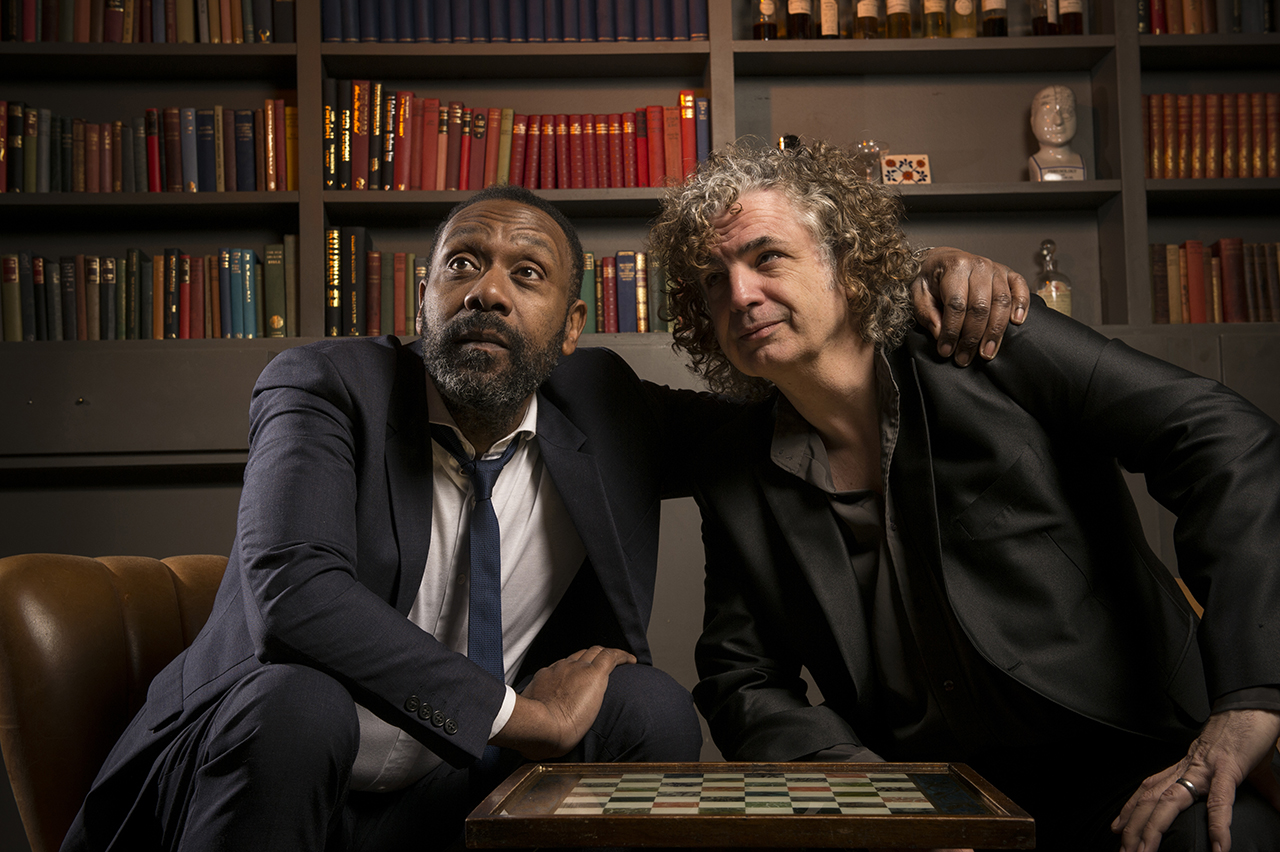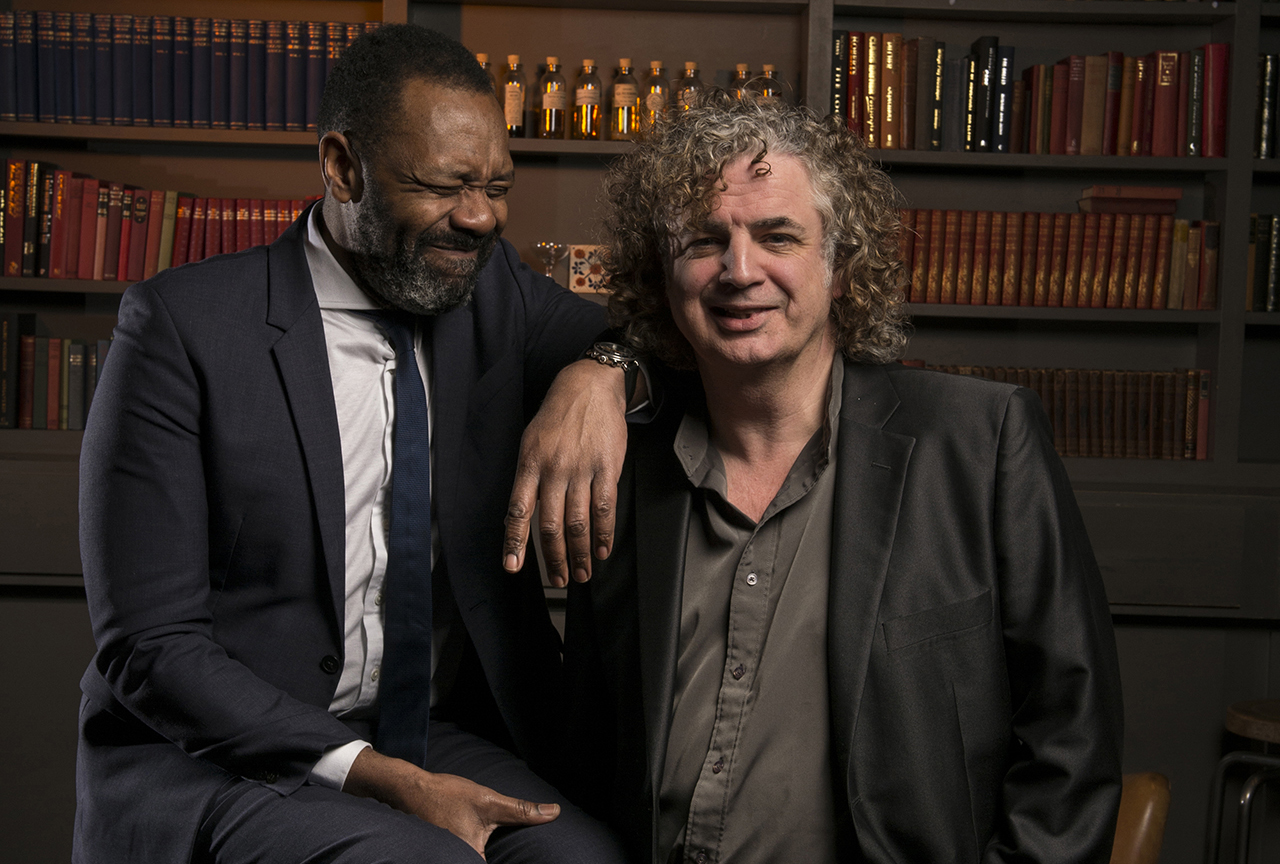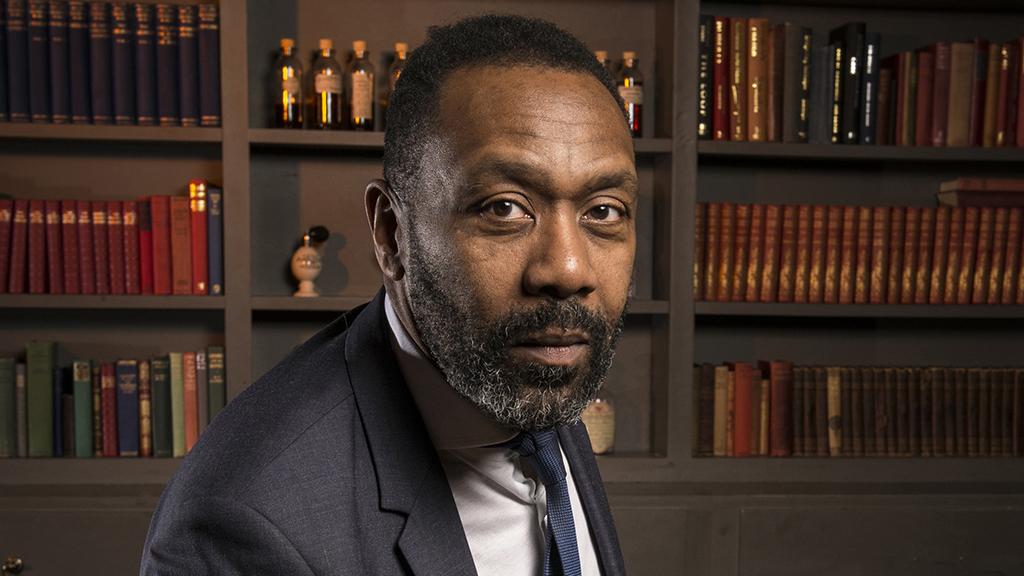British comedy mainstay Sir Lenny Henry and prog-rock multi-instrumentalist Michael ‘Jakko’ Jakszyk have many things in common, but style is not one of them.
“You need a haircut,” the close-cropped Henry says to Jakszyk as he bounds into a quiet room behind the bar at the British Film Institute on London’s South Bank. Henry – who despite his regal appellation is very much just ‘Lenny’ today – politely but firmly suggests that his partner’s shoulder-length mane might be a throwback to another era, when long-haired rockers roamed the earth. Jakszyk takes umbrage at this.
“I’ve just had it cut,” he says, prompting Henry to splutter as if to say, “You’d never tell…” Jakszyk, who is the singer and second guitarist in King Crimson, is indignant. “Yes,” he says self-mockingly, “but I’m a rock star…” At this, Henry feigns horror and threatens to leave.
There’s a reason why a household name and guitar whizz are goofing around together, and it’s not to film a new sitcom called The Lenny & Jakko Show. No, the pair have just made a blues album, New Millennium Blues, with Henry on wolverine howls, Jakszyk on guitar and production, and a host of musicians creating an authentic blues feel.
It’s not their first venture together. Nor is it the first time they’ve ventured into each other’s domain. Henry, for decades one of our best-loved comedians, an actor, writer and TV presenter, has been a Radio 1 DJ and is famous for his musical parodies. In the 90s, he invited Jakszyk to provide multi-instrumental back-up on one of his standup tours.
“I’ve known Jakko for a long time,” he explains. “He’s a very clever guy. He compliments you and leaves space; he doesn’t play over you. There’s never any showing off. I was very impressed by that.”
And Jakszyk has dabbled in the world of comedy, making cameo appearances in the French And Saunders TV show (playing a sidekick to comedy music duo Raw Sex) and Birds Of A Feather. He produced the 1987 novelty hit The Stutter Rap by Morris Minor & The Majors. In 1992 he appeared alongside Henry in the BBC TV film In Dreams, playing Michael Jackson’s recording engineer.
But New Millennium Blues is no joke. On the covers (Back Door Man, Hoochie Coochie Man) they play it straight, while hard-hitting originals (the title track, The Cops Don’t Know) bring the blues bang up to date, tackling such hot-button topics as Ferguson and fracking, police brutality and Black Lives Matter.
“‘Serious as a heart attack’ – that’s a phrase I hear a lot these days,” says the Dudley-born Henry. Suddenly the wisecracking and banter have stopped. He orders a cup of tea – English breakfast, nothing fancy – as a litany of contemporary atrocities springs to mind.
“Go to that Guardian website where they count the number of people dying every week [at the hands of the police in the US],” he urges. “There are people opening fire in schools and cinemas. They’ve got to do something, and they’re not.
It’s horrifying. It needs to be addressed.”
Indeed it does. But by him? Can cuddly mainstream entertainers truly sing the blues?
Sir Lenworth George Henry, CBE puts down his tea and considers the question. There is a moment’s frosty silence. Then the answer occurs to him, in typically comical fashion.
‘Woke up this morning,’ he croaks, channelling John Lee Hooker while a knowing smile creeps across his face, ‘had a glass of champagne…’

Henry’s collaboration with Jakszyk, and the album’s expressions of simmering rage at the world’s injustices, aren’t exactly bolts out of the blue(s). In December 2014, Henry was invited to guest-edit an edition of Today, Radio 4’s heavyweight current affairs programme. He took the opportunity to put the spotlight on diversity in the media and other areas of public life by featuring a presenting team made up exclusively of people from ethnic minorities.
The following year he made a documentary for Sky Arts, Lenny Henry’s Got The Blues, in which he endeavoured to find out why there have been, historically, so few black British blues singers. It culminated with Henry performing a one-off blues gig. New Millennium Blues is the natural corollary of those events.
It turns out, handily, that neither Henry nor Jakszyk are strangers to suffering. Indeed they both compare notes with regard to miserable experiences – “one-downmanship”, as Henry calls it, to laughter from both sides. Then Henry frowns. “Everybody’s got sadnesses,” he says.
So what sparked this new consciousness about race?
“It’s not a new consciousness,” he replies, testily. “It’s growing up in this country. My mum wasn’t a black-power person, she was just a black woman working for minimum wage in a factory. And I saw the effects of that every day of my life, her trying to put food on the table. My dad worked in a factory, too. And my family were all racially abused when they got here.
“I was one of three black kids in my school. Then I was moved to another school, where there were more black and Asian kids, and I had a fight about racism every day until I decided not to rise to the bait again. If I didn’t I’d still be fighting to this day. I’m not going to respond to every racial slur.”
Jakszyk had a complicated upbringing, full of conflict. His mother was an Irish singer who moved to Arkansas, his father an unknown American airman. He was adopted at 18 months by two European refugees, who settled in Croxley Green, just outside Watford in Hertfordshire.
Jakszyk’s family life was unhappy, and so was school, where, in the 60s and 70s in the Home Counties, ethnic minorities were few and far between. The kid “with the Polish surname, curly hair and less than lily-white skin got called ‘Paki’,” he recalls, still reeling from the unpleasantness of it.
“You store all this stuff up,” Henry picks up. “If you’re a kid and you hear all these things… It doesn’t matter where you end up. It’s me working for the BBC and not having a meeting with a black person for forty years. It’s me going on film sets for forty years and never seeing anybody who looks like me behind the camera. I was asked to set the agenda [on Radio 4]. It was a programme about diversity, but there were no people of colour behind the glass. The only person of colour was the one who kept asking if I wanted a cup of tea.”

Henry knows he’s been fortunate. But good fortune doesn’t outweigh the iniquities.
“I’ve been very fortunate,” he accepts. “I’ve had my own TV show, sung with Jeff Beck and Tom Jones, I’ve met Philip Bailey from Earth, Wind & Fire, and James Brown who told me [does cartoonishly rasping funk godfather impression], ‘You need to gargle with salt water!’ I’ve hung out with Lemmy. I’ve had a really lovely career. But that doesn’t stop you being a human being, having a brain or having feelings. You can still respond to things and go: ‘Jesus, that’s not right.’”
Those “things” are still happening. Henry was recently “virtually” abused, even accosted on the London Underground.
“The day after I made a diversity speech at BAFTA [in 2014] I was racially abused online,” he recalls. “I haven’t been racially abused since school. It also happened on a train in South London. Literally, this person was saying: ‘They should all be exterminated; they should go back to Africa.’ This was said very loudly on a Tube carriage.”
Did he respond?
“No,” he says, keen to see the funny side even when the going gets grim. “I went and sat near a very large black lady in the hope that she’d protect me if things kicked off.”
Henry and Jakszyk’s is no marriage of convenience. Not only have they worked together on and off over the years, they’re also good friends.
With a shared love of Frank Zappa, Thin Lizzy and David Bowie, Michael Jackson and Quincy Jones, they were bound to get on. Henry has long been known for his musical skits, usually ones affectionately mocking soul singers, notably Theophilus P Wildebeeste, a barely veiled tribute to R&B lothario Teddy Pendergrass. And yet, he acknowledges, the timbre of his voice was actually more suited to the blues. He even lampooned the growling blueswailer during his 1989 concert, Live & Unleashed, via a character called Lowdown Finger-Lickin’ Dirty Hound-Dog Smith. “After I did that, everybody kept saying: ‘You should do more of that!’ But I always resisted it because I was a soul boy. But as I got older and listened to these songs more, my interest [in the blues] grew.”
A couple of pieces of footage, found on YouTube, of Howlin’ Wolf and John Lee Hooker, proved especially inspirational.
“Howlin’ Wolf was blisteringly on fire,” Henry enthuses. “You could power the national grid with that energy. And John Lee Hooker. Oh my God, a geezer with a guitar doing that,” he stomps his sneaker down hard on the floor, and you can picture the hipsters quietly poring over their laptops in the bar beyond the velvet curtain wondering why the ground just shook. “That has more impact than Coldplay at the Super Bowl.”
By the time he filmed the Sky documentary, he and Jakszyk “had already started a conversation about writing songs for an album”.
The rule established early on was that there had to be new material. Henry surprised himself at his ability to not just sing but also write the blues.
“I guess it’s always been there,” he says of his infrequent public addresses. “There are odd occasions where I speak about things. A friend said: ‘Len, when you’re angry you get incredibly lucid.’”
At Jakszyk’s prompting, Henry decided to write about stuff that moved him, with a little beyond-the-grave encouragement from the two godfathers of conscious songwriting: Curtis Mayfield and Marvin Gaye.
“New Millennium Blues has a direct correlation to [Gaye’s] Inner City Blues,” he admits. “That’s Marvin Gaye ticking off all the things troubling America at that time. Now you could write that song again. In fact you could write it every week.”
Did he have to de-Delta his vocals and make them more Dudley?
“There is a thing about how the blues sounds if you don’t sing in an American accent,” he says, concerned. “But part of the language of R&B and blues is that it’s an American milieu, so you have to do it.”
Talking of authenticity. Where does Hugh Laurie, another successful comedian and actor who made a blues album [Didn’t It Rain, in 2013] fit into all this?
Henry sees this question coming a mile off. “That’s naughty,” he chides. “You’re trying to get beef between the Oxbridge posse and the Dudley posse.”
Has he played Laurie his album?
“No. I’d be scared to,” he replies. He also points out that he and Laurie, together with Ben Elton and Adrian Edmondson, used to play in a funk band called Poor White Trash. “Listen,” he says. “Hugh might be a massive star in America, but he can play. And he’s better than you think he’s going to be.”
No gentle ribbing is going to stop Henry now he’s in flow.
“I loved it,” he says of his blues adventure. “I want to do more, to write more songs. The blues is a departure point. But if you want to sound like yourself, you have to start thinking: what do I really think about Syrian refugees, or that guy battering his missus to death? If you can encapsulate it in three verses, a bridge and a chorus, then you’ve done something. It might not be Born To Run or Superfly, but it’s your attempt to encapsulate these thoughts in three or four minutes. And I’m going to do it. If Jakko wants to keep writing songs with me, I’ll do it.
“It’s easy to take the piss, innit?” he says, finally, imagining the puzzlement, even hostility, from certain quarters at a blues album by the bloke from the Premier Inn adverts. “I guess what you’re asking is: is this a vanity project, or the real thing? And it is the real thing.”

